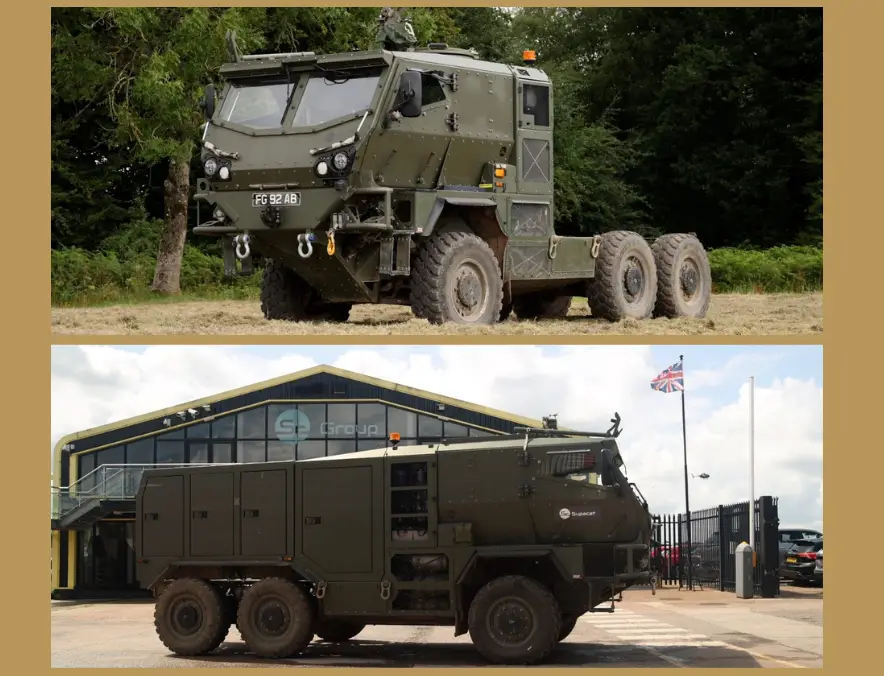On display at the world’s largest defence show DSEI, Supacat’s Common Base Platform will be ‘integral’ to the British Army’s ‘Modernisation of Equipment’ within UK Government’s Land Industrial Strategy. As the British Army gears up to meet one of the MoD Land Industrial Strategy’s (LIS) objective which is to rationalise its current fleet of land mobility platforms from 35 to 15, Devon-based Supacat will be showcasing its High Mobility Transporters (HMT) Common Base Platform (closed cab / flatbed) at this year’s DSEI event, September 12 -15. The company will be exhibiting on Stand H4-460. Supacat received an order from MOD for a further 70 of its HMT systems in February this year. These common base platforms can be fitted with mission modules to fulfil a variety of roles and agile operational needs as the Army makes this important transition. This, Supacat says, is ‘integral’ to the Army’s rationalisation of its fleet by 2035, given the directive to maximise collaboration between the MoD, the Army and wider industry.
Nick Ames chief executive, said: “2023 has been a very busy, but productive and exciting year for us. We continue to fulfil all production requirements for the Jackal 3, and our production line is ready to meet customer demands from the UK and export markets as required. As one of the MoD’s key industrial suppliers we remain committed and fully support the LIS.”
Phil Applegarth director, head of Supacat, said: “In a rapidly changing world, one of increased threats from land and air, it is vital that modern armies acquire the simplicity and flexibility afforded by versatile mobility platforms that share common or interchangeable parts to simplify supply, maintenance and logistics and enhance combat effectiveness. While the LIS itself is relatively new, Supacat has a 40-year pedigree of pioneering modular solutions for the British Army, enabling a variety of vehicle types to meet operational requirements and in-theatre needs. Our Mk 2 common base modular platform, can be easily re-rolled during its lifecycle through update, upkeep, upgrade, offering the value and flexibility required to support the modernisation of equipment objective within the strategy, and of course paving a smoother fleet transition for the MoD and the Army.”
Attendance at DSEI comes at a very busy time for Supacat. Following the Army’s requirement earlier this year for The Jackal 3, Supacat in collaboration with Babcock International Group Plc, production is in full flow and set to meet the required delivery targets. The order could potentially rise to 240 should operational requirements demand.
Supacat’s HMT Common Base Platform family of vehicles are the heritage of Supacat’s design philosophy. The vehicles all share proven sub-systems leading to increased reliability and reduced logistic support. They can be configured with a variety of mission modules and protection levels to best suit operational requirements. These variations start with 4 x4 or 6×6 drivelines and end with open or closed architectures ranging from 6500-12000kg Gross Vehicle Mass.
Supacat is the world’s leading specialist in the design and development of high mobility defence vehicles with over 1000 specialist, battle-proven vehicles delivered into service globally. Part of SC Group, it is an innovative engineering and design company providing global, defence focused products and services, with offices in the UK and Australia. Its agility and speed enable Supacat to provide and fully support high performance solutions in short timescales. The UK Ministry of Defence’s procurement of Jackal and Coyote vehicles demonstrates the regard in which Supacat’s capabilities and products are held. Supacat is part of SC Group. Building on three decades of engineering design success, SC Group has grown to be one of the world’s leading companies specialising in the design and development of equipment operating in harsh environments, bringing innovative solutions to our customers in a range of sectors, from defence and oil & gas to renewable energy, nuclear power to mineral exploration.















